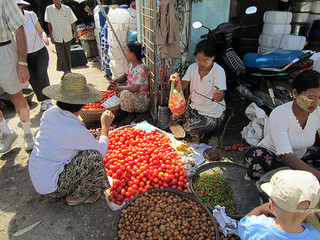 Myanmar is right to take steps to reduce its reliance on informal and segmented markets, and build the formal sector of its economy to achieve the broad-based growth it desires, said Anoop Singh, head of the Asia and Pacific Department for the IMF.
Myanmar is right to take steps to reduce its reliance on informal and segmented markets, and build the formal sector of its economy to achieve the broad-based growth it desires, said Anoop Singh, head of the Asia and Pacific Department for the IMF.
“What Myanmar is trying to do is to implement economic and other reforms to integrate and unify markets, so that activities are not in segmented, parallel, or shadow markets,” Singh told a seminar in Washington, DC.
The country’s economic reforms have focused on building the institutions needed to run a modern market-based economy. They include reform of the exchange rate system, increased budget transparency, the passage of investment, agricultural and land laws, and a draft law for the creation of a newly autonomous central bank.
Myanmar has been heavily reliant on informal markets for decades, and this has prevented resources from being directed to areas where they are most needed, particularly agriculture.
“Today, about two-thirds of the population depend on agriculture, on the rural sector—a sector where there is clear need for investment and better integration with the rest of the economy,” said Singh. “The focus of the efforts is to ensure that resources … go to sectors that are needed for inclusive and broad based growth,” he said.
Priscilla Clapp, formerly U.S. chief of mission in Myanmar, said that over 50 years of military rule had left Myanmar with very weak institutions and capacity, and that the country’s people needed to concentrate much of their efforts in this area.
“They desperately need the kinds of institutions which will support a sustainable democracy,” said Clapp, but she warned that “it’s going to be a long haul, it’s going to take probably two or three generations to get this in proper working order.”
Frances Zwenig, president of the US-ASEAN Business Council Institute, also called on potential investors to have a long-term perspective.
“There are no quick hits, no easy in-and-outs. It is still whom you know. Due diligence is the coin of the realm,” said Zwenig, who added that Myanmar’s ability to assimilate and apply new practices to commercial ends—its “absorptive capacity”—was still very limited.
“Everything will go slowly for a variety of reasons,” she warned, “but mind you, that is probably a good thing,” said Zwenig, who added that the goal for the country should be to pursue greater transparency and accountability.
Lex Rieffel, of the Brookings Institution and author of a forthcoming study on foreign aid to Myanmar, said that despite the immense challenges confronting Myanmar and the time it would likely take for reforms to be adopted, the authorities “had taken many of the right steps by just pulling the military out of governance.”
Photo: EguideTravel.com




